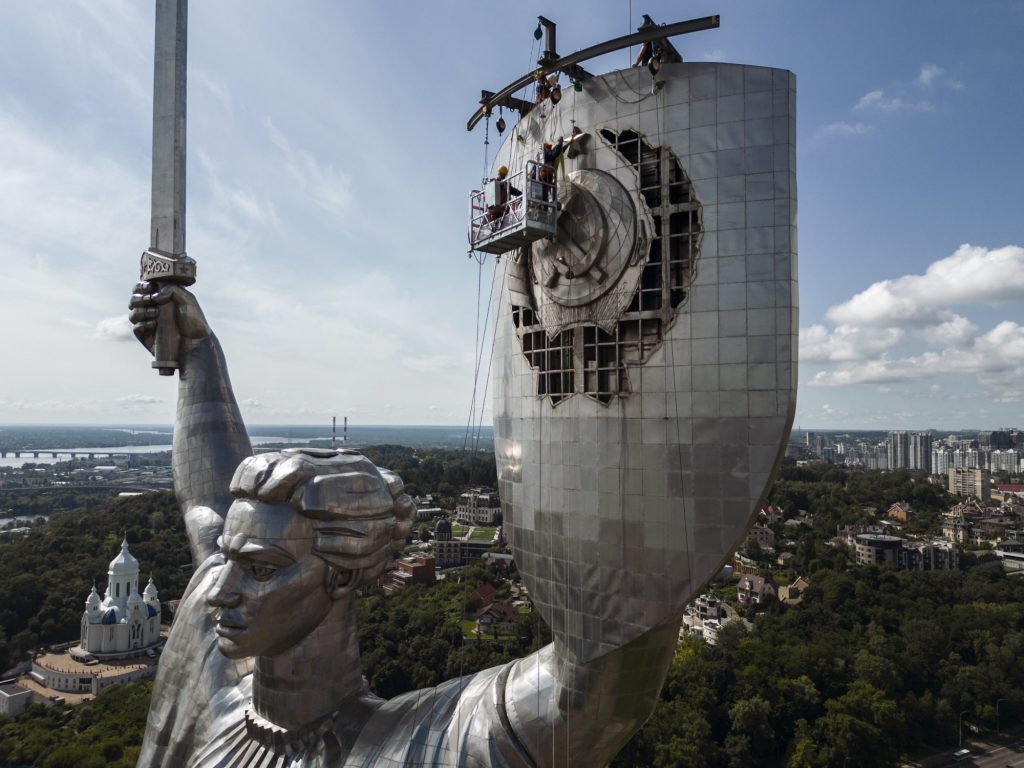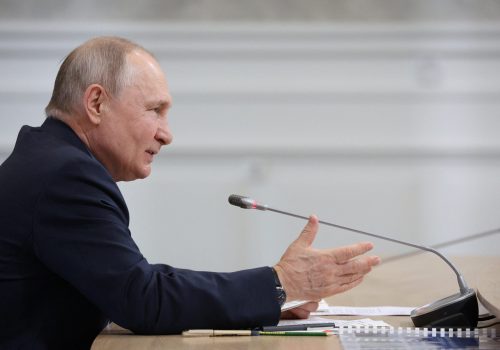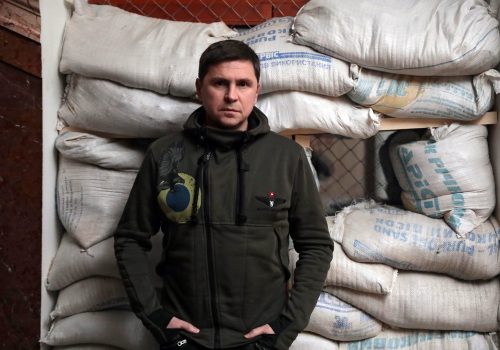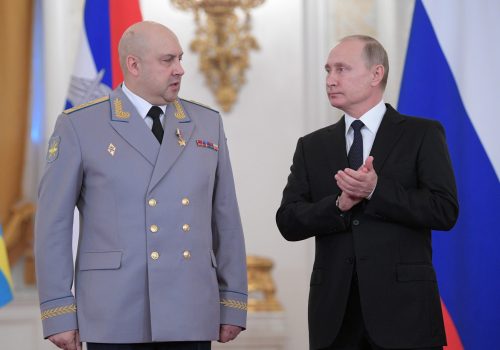The full-scale Russian invasion of Ukraine has highlighted the very different developmental paths the two countries have chosen following the collapse of the USSR three decades ago. Although Vladimir Putin continues to promote Soviet-era propaganda depicting Russia and Ukraine as “one people,” it is obvious to independent observers that the divide between the neighboring nations has never been wider. Since 1991, Ukrainians have done much to shake off the shadows of authoritarian empire and regain their agency; in contrast, Russian society remains firmly trapped in the imperial past.
There are a number of key factors behind Ukraine’s post-Soviet transformation from totalitarian society to a more recognizably European identity. At the grass roots level, Ukraine has experienced three revolutionary protest movements that have empowered the public and redefined the relationship between the state and society. The 1990 Granite Revolution, 2004 Orange Revolution, and 2014 Euromaidan Revolution all championed the fundamental democratic principles of individual human rights and the rule of law. Nothing comparable has taken place in Russia, hence the passivity and almost complete lack of agency that characterizes modern Russian society.
Ukraine has also experienced an extended period of democratization. With the exception of the 2004 presidential vote, every single Ukrainian election since 1991 has been recognized by international watchdogs as free and fair. The consolidation of Ukraine’s democratic culture has been supported by the country’s Euro-Atlantic aspirations, with both the EU and NATO setting reform benchmarks that have helped to build a genuinely durable democracy. Unlike Ukraine, Russia struggled to establish a credible democratic system during the early post-Soviet period and is now once more a dictatorship.
Since regaining independence in 1991, Ukraine has slowly but steadily sought to distance itself from the country’s imperial inheritance by removing symbols of the totalitarian past. Beginning in the early 1990s with policies that were often enacted at the local level, this process gained momentum following the 2014 Euromaidan Revolution and the 2015 adoption of decommunization laws, which brought Ukraine closer into line with similar legislation already in place in the three Baltic states and much of Central Europe.
Under Putin, Russia has moved in the opposite direction. The Putin regime has built modern Russian national identity around the quasi-religious veneration of the Soviet role in World War II, and has actively rehabilitated Stalin. While most Ukrainians hold negative views of the Soviet dictator, a majority of Russians regard him positively. Crucially, Ukraine’s anti-totalitarian legislation targets both the Soviet and Nazi regimes, while Russia has criminalized any attempts to compare the two. Ukraine’s laws equating Nazi and Soviet crimes reflect resolutions adopted earlier by European bodies including the European Union, the OSCE, and the Parliamentary Assembly of the Council of Europe.
Stay updated
As the world watches the Russian invasion of Ukraine unfold, UkraineAlert delivers the best Atlantic Council expert insight and analysis on Ukraine twice a week directly to your inbox.
In response to the full-scale Russian invasion of February 2022, Ukraine’s decommunization drive has broadened to embrace derussification in a more general sense. This focus on the legacy of the Russian Empire in Ukraine was perhaps long overdue. After all, Putin himself has spoken openly of the continuity between the Czarist and Soviet empires, which he and many others in modern Russia regard as different chapters in the same imperial history. Indeed, in a December 2021 documentary, Putin specifically lamented the fall of the USSR as “the disintegration of historical Russia under the name of the Soviet Union.”
With Russian troops now waging a genocidal war in Ukraine and Putin declaring occupied Ukrainian lands to be “forever Russian,” Ukrainians have responded by seeking to remove all symbols of Russian imperialism from their country. Place names have been changed and statues of Russian generals, politicians, and literary figures have been dismantled. The most striking example of this process was the removal of a major monument honoring eighteenth century Russian Empress Catherine the Great from the heart of Ukrainian Black Sea port Odesa, a city which had formerly been viewed as a bastion of pro-Russian sentiment in independent Ukraine.
The societal shift away from Russian influence in wartime Ukraine is also immediately apparent at street level. In protest at Putin’s weaponization of the Russian language, many Ukrainians have chosen to switch from Russian to Ukrainian in their daily lives. Ukrainian radio stations no longer play Russian pop music, while Ukrainian TV channels have stopped broadcasting the Russian dramas, comedy shows, and soap operas that once dominated the country’s broadcasting schedules. Even the Russia-aligned branch of the Ukrainian Orthodox Church has scrambled to distance itself from Moscow.
Eurasia Center events

Ukraine’s rejection of the authoritarian past and embrace of democratic values helps explain why the country has been able to resist Russian military aggression so successfully. The vibrant civil society and dynamic culture of volunteerism that have evolved in Ukraine over the past three decades have played key roles in the fightback against Russia’s invasion.
The differences between modern Russia and Ukraine are also very much in evidence along the front lines of the war. The Russian army is still dominated by rigid hierarchies that stifle battlefield initiative, and is marked by a culture of submissive deference to authority characterized by frequent video addresses by soldiers appealing personally to Putin. In contrast, the Ukrainian military displays high degrees of mobility and adaptability that reflect the comparative freedoms of modern Ukrainian society. A Russian officer from the Czarist or Soviet eras would feel instantly at home in Putin’s army, but he would find that he had very little in common with his Ukrainian counterparts.
The momentous events of the past eighteen months have confirmed the historic shifts of the previous three decades. It is now beyond any reasonable doubt that Ukrainians have decisively rejected the imperial past and have instead chosen a European future. By the time Russia’s full-scale invasion began, a majority of Ukrainians had already become confident in their ability to shape their own future and no longer clung to the paternalistic comforts of the authoritarian era.
A May 2023 poll by the Razumkov Center found that a record 87% of Ukrainians rejected the restoration of the Soviet Union. This number is likely to climb even higher as any lingering nostalgia for the authoritarian past fades away amid a mounting catalog of Russian war crimes and the passing of the last fully-fledged generation of Soviet Ukrainians. If Putin hoped his invasion of Ukraine would signal the dawn of a new Russian Empire, he could not have been more mistaken.
Taras Kuzio is a professor of political science at the National University of Kyiv Mohyla Academy. His latest book is “Genocide and Fascism. Russia’s War Against Ukrainians.”
Further reading
The views expressed in UkraineAlert are solely those of the authors and do not necessarily reflect the views of the Atlantic Council, its staff, or its supporters.

The Eurasia Center’s mission is to enhance transatlantic cooperation in promoting stability, democratic values and prosperity in Eurasia, from Eastern Europe and Turkey in the West to the Caucasus, Russia and Central Asia in the East.
Follow us on social media
and support our work
Image: Workers remove a Soviet coat of arms from the shield of the Motherland monument in Kyiv. August 1, 2023 (Photo by Maxym Marusenko/NurPhoto)




